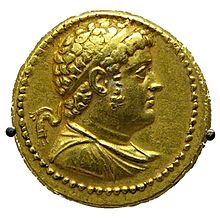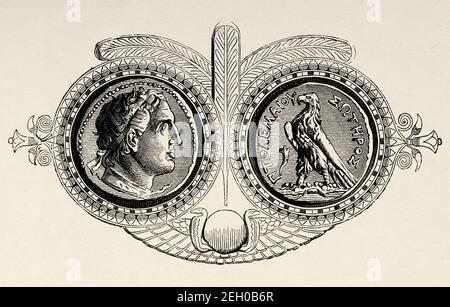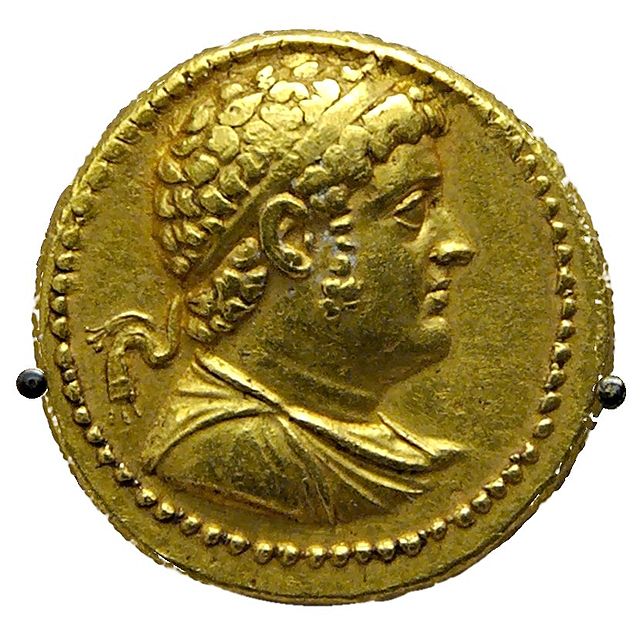Ptolemy IV Philopator: The Reign of a Controversial Egyptian Pharaoh
Ptolemy IV Philopator: The Reign of a Controversial Egyptian Pharaoh
Ptolemy IV Philopator, who ruled Egypt from 221 to 204 BCE, marks one of the most contentious and complex periods in the history of the Ptolemaic Dynasty. His reign is characterized by both internal decadence and external challenges that underlined the weaknesses within the Ptolemaic Kingdom—a state powerful in breadth yet fractious in its internal machinations.
The Early Life and Ascension to the Throne
Born in 244 BCE in Alexandria, Ptolemy IV was the son of Ptolemy III Euergetes and Berenice II. His early life in the Egyptian court was shaped by the tides of royal intrigue and the complex web of familial relations that defined the Hellenistic period. When Ptolemy IV ascended to the throne following the death of his father, he inherited a powerful empire that stretched from Libya to the far reaches of Cyprus and parts of the Aegean Sea.
However, the transition of power was not entirely smooth. The ascendancy of Ptolemy IV was marred by a series of court conspiracies, most notably the murder of his mother, Berenice II, an act reportedly orchestrated by his powerful advisor, Sosibius. This tumult set a tone for Ptolemy’s reign, highlighting the challenges of maintaining loyalty among court officials and influence over regional governors.
The Battle of Raphia: Conflict with Antiochus III
One of the critical events during the reign of Ptolemy IV was the Battle of Raphia in 217 BCE, where his forces clashed with the armies of Antiochus III of the Seleucid Empire. This battle was not just a fight over territories in Coele-Syria but also a broader contest of dominance between two major Hellenistic powers.
Under the leadership of his generals, including the trusted Sosibius, Ptolemy’s army, significantly composed of native Egyptian soldiers, faced off against a well-equipped Seleucid force. The battle showcased Ptolemy’s ability to rally and train a formidable army, despite his often-debated leadership qualities. In the end, Ptolemaic forces emerged victorious, securing Egypt's control over the contested territories and temporarily bolstering Ptolemy's reign.
Domestic Administration and Controversies
Ptolemy IV’s reign was marked by several domestic policies that focused on religion and culture, yet his administration often faced criticism for neglect and corruption. He is credited with constructing and sponsoring numerous religious monuments and temples, including the renowned Temple of Horus at Edfu, which stands as a testament to the grand architectural endeavors of the period.
However, his pursuits were not without criticism. Ptolemy IV’s administration became infamous for luxurious indulgence and political negligence. Historical accounts by ancient chroniclers, though sometimes colored by bias, portray him more preoccupied with the pleasures of the court than the rigors of governance. This lapse opened the doors to corruption and weakened centralized control over the expansive Ptolemaic territories.
The Decline of Royal Authority
As Ptolemy IV's reign progressed, the amplification of internal dissent and the rising influence of his court advisors led to a steady decline in royal authority. Social unrest, largely fueled by economic difficulties and increased burdens on native Egyptians—despite their contributions during crises like the Battle of Raphia—further strained relations between the ruling Greeks and native Egyptian populations.
The latter years of his rule were overshadowed by increasing domestic unrest, aggravated by Ptolemy’s failure to address growing socio-economic disparities within his kingdom. This period sowed seeds of rebellion, which would continue to ferment and ultimately weaken the governance of his successor, Ptolemy V Epiphanes.
While attempts were made to maintain facade stability, including efforts to engage with Egyptian religious traditions more directly, the societal divisions stoked by years of administrative mismanagement could not be easily reconciled.
The Role of Sosibius and Agathocles
The political sphere of Ptolemy IV's court was dominated by influential figures like Sosibius and Agathocles, whose manipulations greatly impacted the trajectory of his reign. Sosibius, in particular, was instrumental in securing Ptolemy's ascendancy by orchestrating the elimination of any perceived threats, a move that consolidated his power behind the throne.
Agathocles, equally ambitious and wily, connived his way into the royal family's trust, earning high-ranking positions within the government. Together, their governance style was characterized by intrigue and a focus on self-aggrandizement over the kingdom's welfare. Their influence was pervasive; they employed cunning tactics, often resorting to political purges and opaque dealings to maintain their sway over the king and the broader kingdom.
This reliance on powerful advisors was a double-edged sword. While it allowed Ptolemy IV to navigate initial challenges, it also put him at the mercy of their ambitions, often at the expense of competent governance. The deep-seated reliance on these advisors weakened the traditional executive control emanating from the Pharaoh, leading to decentralized power that often spiraled into chaos.
Cultural Contributions and Greek Influence
Under Ptolemy IV's rule, the cultural landscape of Egypt was richly infused with Greek traditions, reflecting the broader Hellenistic influence that was prevalent across the territories. Alexandria, the Ptolemaic capital, became a beacon of Hellenic culture, drawing scholars, artists, and philosophers from across the Mediterranean world.
The famed Library of Alexandria continued its tradition of scholarship, acting as a central repository of human knowledge and an anchor for cultural achievements. Despite his apparent detachment from the day-to-day governance, Ptolemy IV showed a keen interest in the arts and sciences. This patronage allowed for the flourishing of literature, poetry, and scientific inquiry, ensuring that Alexandria remained the intellectual heart of the Hellenistic world.
However, this cultural zenith also highlighted the disparities within Egyptian society. The emphasis on Greek forms and functions often overshadowed native Egyptian traditions, causing subtle tensions which would later manifest in more pronounced societal divides. The hybridization of cultures, while beneficial to art and philosophy, inadvertently sowed seeds of identity conflicts among the native populace.
Religious Policy and Legacy
Ptolemy IV's reign was also marked by his initiatives in the religious domain, which sought to consolidate his rule and earn the favor of the Egyptian populace. His dedication to constructing temples and monuments exemplified a strategy to appease the native Egyptian deities, an endeavor underpinned by political pragmatism.
He promoted the integration of Greek and Egyptian religions, a move designed to bridge the cultural gaps between the ruling elite and the indigenous people. This syncretic approach found its embodiment in the worship of Serapis, a deity unifying Hellenistic and native Egyptian religious elements, and promoted in both iconography and cult practices.
Despite these efforts, Ptolemy IV's religious policies were perceived as attempts to legitimate his rule rather than genuine spiritual commitment, leaving his legacy in this sphere contested and complex.
The Death and Succession of Ptolemy IV
The end of Ptolemy IV's reign came with both personal and political turmoil. His health and the quality of his rule declined, contributing to increasing destabilization within Egypt. His death in 204 BCE opened a power vacuum that his advisors, Sosibius and Agathocles, sought to fill by orchestrating the ascension of his infant son, Ptolemy V Epiphanes.
The transition of power was fraught with intrigue and chaos. Agathocles' regency for the young Ptolemy V was marked by unrest and uprisings, a testament to the simmering discontent leftover from his predecessor's rule. Notably, the events that transpired immediately after Ptolemy IV's death showcased the brittle nature of dynastic successions clouded by ambition and treachery.
Ptolemy IV’s Enduring Impact
In historical retrospection, Ptolemy IV Philopator’s reign is frequently viewed through a prism of decline, one that charts the gradual erosion of centralized authority that would continue to affect his successors. Despite his contributions to culture and religion, his era is often overshadowed by reports of opulence and political neglect, characteristics that are extensively recorded by historians such as Polybius and others.
Yet, the defining legacy of his reign stretches beyond individual assessment, serving as a reflection of broader socio-political dynamics during the Hellenistic period. It underscores the challenges of balancing diverse cultural traditions, the perils of administrative complacency, and the fragile nature of power sustained by delegation.
Ptolemy IV Philopator’s time as Egyptian pharaoh stands as a complex tapestry interwoven with elements of cultural brilliance and political frailty—an era of opportune triumphs and eventual destabilizations that charted the course for subsequent rulers in navigating an increasingly fragmented Ptolemaic realm.








Comments